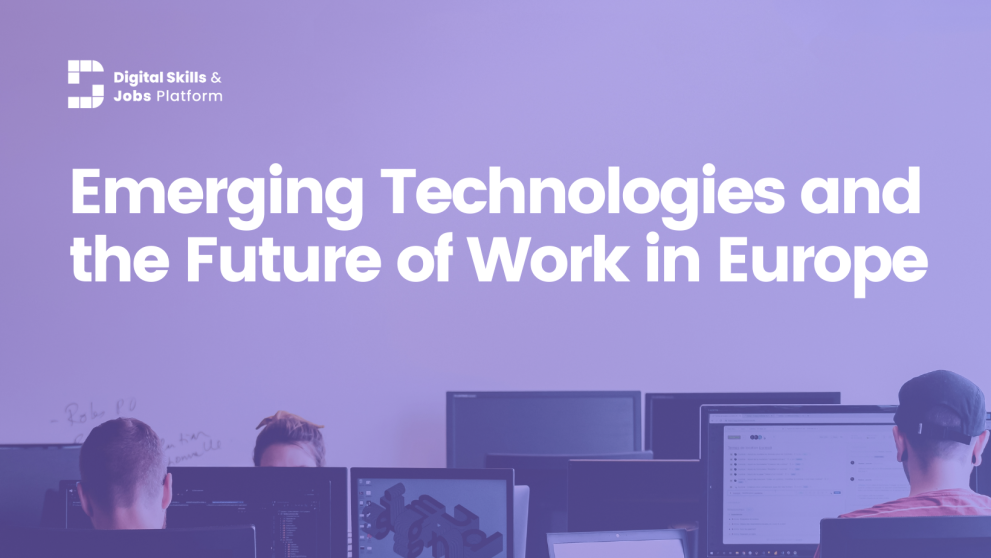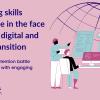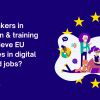Emerging technologies and the future of work in Europe

Emerging technologies are not just the future—they're changing the job market in Europe today. New technological solutions like Artificial Intelligence (AI), the Internet of Things (IoT), Blockchain, Big Data, Robotics, and Augmented/Virtual Reality (AR/VR) are creating opportunities for growth and development, driving significant changes across industries. As a result, we must adapt quickly to maintain competitiveness in a landscape that’s changing fast.
Doc, the future is digital
From healthcare to finance, and manufacturing to energy, thanks to technology every sector is evolving at an unprecedented rate. In healthcare, advanced technologies can enhance patient outcomes and lead to higher-quality care. The financial services industry has been influenced by innovative technology, which can benefit both consumers and companies by giving greater access to financial services, offering wider choice and increasing efficiency of operations. Emerging technologies are transforming renewable energy, making clean sources more accessible, efficient, and cost-effective.
Technology is reshaping both how we work and the types of jobs available.Emerging technologies can transform industries by offering new services, making processes more efficient, and creating fresh business opportunities. However, they also bring challenges due to their complexity and newness, which can be difficult for the workforce to keep up with. While these technologies do not directly lead to unemployment, they highlight the urgent need for upskilling and reskilling to help workers navigate significant changes in their job roles brought on by digital advancements.
Digital skills? Where we are going we need (advanced) digital skills
As these technologies reshape the workplace, the skills required to compete for jobs are also changing. In 2021, about 86.3% of people employed in the European Union were using digital devices (such as computers, tablets, smartphones, or other connected technology) to perform their work tasks (CEDEFOP). There is no doubt that basic digital skills are a precondition for inclusion and participation in the labour market and society. However, emerging technologies are triggering a wave of demand for a new generation of advanced digital skills. It is expected that by the year 2035, approximately 15% of all jobs in the 27 countries of the European Union are expected to be in high-tech sectors (CEDEFOP). The demand for workers who can understand, operate, and innovate with these technologies is at an all-time high.
Despite the strong demand, there is a digital skills gap in Europe. Currently, only 28% of people possess above basic digital skills, and a mere 9.8 million people are employed as ICT specialists across the continent (DESI 2024). This gap highlights the urgent need for reskilling and upskilling initiatives to ensure the workforce can meet the challenges and opportunities presented by emerging technologies. A digitally skilled workforce is crucial for organizations to innovate and stay competitive.
European companies already face increased competition for digitally skilled talent, in 2022 more than 60% of EU enterprises that recruited or tried to recruit ICT specialists reported difficulties in doing so (Report on the State of the Digital Decade 2023). But not only, significant advanced digital skills gaps appear in more traditional non-ICT professions, for example, medical doctors who rely increasingly on advanced digital technologies to provide more accurate diagnoses, or sector specialists needed to unlock the potential of innovative digital solutions in the green transition. (Report on the State of the Digital Decade 2023-Annex 1). With 70% of EU companies citing a lack of digital skills as a barrier to investment, Europe faces a significant skills gap (European Commission). Bridging this gap is key to boosting competitiveness, and employability, and promoting digital inclusion, central to the EU's digital skills agenda. Equipping people with the right skills to succeed can create new opportunities for workers and employers.
An advanced digitally skilled workforce
The digital era is reshaping labour markets and transforming skill requirements. The future of work is undeniably digital! While technology reduces the need for some job roles, it also creates new opportunities. As it progresses, new professions and industries develop, redefining the nature of work and employment. New work models are developing and are characterized by greater flexibility, decentralization, and an emphasis on knowledge-based activities. These changes in the labour markets driven by emerging technologies require an adequate response from key players to mitigate skills shortages. Large-scale investment in digital training is necessary across all European countries to remain competitive. Initiatives aimed at reskilling workers and fostering digital literacy must be prioritized to ensure no one is left behind in this digital revolution.
At the European level, the Digital Europe Programme (DEP) has invested over EUR 294 million to support skilling, upskilling and reskilling initiatives to improve the digital skills of the EU's workforce. These training initiatives cover areas such as artificial intelligence, data science, cloud computing and cybersecurity. DEP also finances initiatives to attract young talent to the field of ICT, build a strong EdTech ecosystem, and facilitate secure data sharing through the Common European Data Space for Skills.
Whether you are beginning your career or considering a change, gaining the right digital skills is key to securing a successful future for Europe. Now is the time to take action and arm yourself with the skills and tools necessary to succeed in an ever-evolving digital world.
Check out these trainings and learnings to power up your digital skills:
CloudCamp4SMEs: High-Skilled Employees - Cloud Security Engineer pathway
Boost your productivity and work efficiency by using Large Language Models like ChatGPT and Gemini
Explainable Artificial Intelligence in Medicine (xAIM) Learning Path - Text Mining
Review of Workforce Upskilling Initiatives for Emerging Technologies in IT





